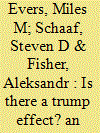|
|
|
Sort Order |
|
|
|
Items / Page
|
|
|
|
|
|
|
| Srl | Item |
| 1 |
ID:
174233


|
|
|
|
|
| Summary/Abstract |
Geopolitical competition increasingly takes place not on the battlefield but in a tightly networked global economy. As distinctions between economic and national security collapse, governments are embracing economic statecraft as a vital element in their foreign policy toolkits. They are learning how to weaponize the interdependencies produced by economic globalization and how to leverage their positions in networks to manipulate and coerce other states.
|
|
|
|
|
|
|
|
|
|
|
|
|
|
|
|
| 2 |
ID:
165862


|
|
|
|
|
| Summary/Abstract |
Does President Trump face domestic costs for foreign policy inconsistency? Will co-partisans and opposition-partisans equally punish Donald Trump for issuing flippant international threats and backing down? While the president said he could “stand in the middle of Fifth Avenue and shoot somebody” without losing voters, the literature consistently shows that individuals, regardless of partisanship, disapprove of leaders who jeopardize the country’s reputation for credibility and resolve. Given the atypical nature of the Trump presidency, and the severe partisan polarization surrounding it, we investigate whether the logic of audience costs still applies in the Trump era. Using a unique experiment fielded during the 2016 presidential transition, we show that Republicans and Democrats impose equal audience costs on President Trump. And by varying the leader’s identity, between Donald Trump, Barack Obama, and “The President,” we demonstrate that the public adheres to a non-partisan logic in punishing leaders who renege on threats. Yet we also find Presidents Trump and Obama can reduce the magnitude of audience costs by justifying backing down as being “in America’s interest.” Even Democrats, despite their doubts of Donald Trump’s credibility, accept such justifications. Our findings encourage further exploration of partisan cues, leader-level attributes, and leader-level reputations.
|
|
|
|
|
|
|
|
|
|
|
|
|
|
|
|
| 3 |
ID:
157544


|
|
|
|
|
| Summary/Abstract |
Why do states intentionally and publicly violate international norms, even when they anticipate (social or material) costs for doing so? Unfortunately, constructivist scholarship on norm-dynamics lacks a well-developed account of deliberate and open norm transgressions. This gap in the literature has led to a limited understanding of resistance to international norms. Constructivist scholarship on norm-dynamics often treats compliance as an inherent “good” that all states move toward. However, I argue that public acts of norm noncompliance can serve important social functions and are strategically performed by states in pursuit of specific (social or material) ends. I demonstrate that states will overtly and self-consciously violate international norms to either assert their identity as insiders or outsiders in international society or to contest those categories altogether. Drawing on work in sociology and the social psychology of deviance, I develop the concept of norm transgressions to capture intentional and purposeful violations of international norms. I present a typology of norm transgressions (rejective, adaptive, inclusionary, and exclusionary) to provide the groundwork for future scholarship on overt resistance to international norms. The concept of norm transgression bears important implications for our understanding of deviancy, institutional compliance, and normative change in international politics.
|
|
|
|
|
|
|
|
|
|
|
|
|
|
|
|
|
|
|
|
|